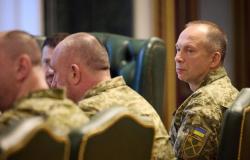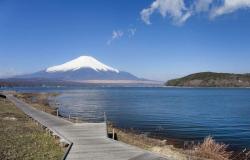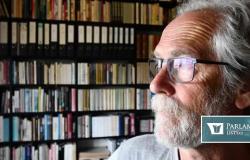When the war in Ukraine began, fears that the world was once again on the verge of using nuclear weapons began to be reflected in the public debate much more often. These discussions are regularly fueled by Russian President Vladimir Putin himself, who is not afraid to intimidate Western allies in this regard. He repeatedly says that Russia is ready for nuclear war.
The belief that such a scenario will not play out is not helped much by Russia’s rejection of a US proposal earlier this year to resume talks on a new nuclear arms control framework. More than a year ago, Putin announced the suspension of participation in the last Russian-American treaty that regulates nuclear weapons.
What will happen if a new pact between the powers is not created, Scott Sagan, a professor from Stanford University, describes in an interview for Seznam Zpravy. “It would be a renewal of the Cold War, in which both sides would try to build and neither of them would be sure that they already have enough,” believes an American expert who traveled to the Czech Republic at the end of March for the Peace Research Center Prague conference .
In the interview, he further discusses China’s expansion of its nuclear arsenal or the consequences of Donald Trump’s possible return to the White House.
What is the likelihood that the conflict in Ukraine will turn nuclear?
I don’t think anyone knows the degree of this probability, not even Vladimir Putin. After invading Ukraine in February 2022, he put Russian nuclear forces on high alert to deter any intervention against Russia. At that time, the probability of their use by the US was very low, no warning activities indicated this.
Come to think of it, there was no reason to use them back then; it was the beginning of an invasion and Putin expected quick success. But that changed radically in September and October 2022, when the Russians lost much of the territory they had gained in the previous months, and Putin, in his annexation speech, not only threatened the abstract use of nuclear weapons, but mentioned that there was a precedent for the successful use of nuclear weapons in 1945 weapon to end the war. That scared people.
Although there is still no large-scale nuclear alert activity, there are already internal conversations within the Russian military discussing the use of nuclear weapons, according to US and British intelligence officials.
When you add it all up, the US intelligence estimates – according to a recent New York Times report – are 50:50.
Scott Sagan
Photo: Stanford University
.
- He is a professor of political science at Stanford University and co-director of the Stanford Center for International Security and Cooperation (CISAC).
- In his work, he mainly deals with the politics of nuclear weapons and nuclear disarmament, including discussions of systemic accidents.
- He also serves as chairman of the Committee on International Security Studies of the American Academy of Arts and Sciences.
- He previously lectured at Harvard and also served as an adviser at the Pentagon.
Did the world leaders try and try to prevent this scenario somehow?
In response, President Biden stated that the use of nuclear weapons by Russia would have catastrophic consequences for the Russians. High-ranking US officials then privately sent a warning to their Russian counterparts, and although we do not know exactly what was said, according to official reports, both Washington and representatives of Britain and France were to threaten a large-scale conventional response.
Whatever was said, it is believed to have had some effect on Putin. However, in my opinion, we should be very careful not to be complacent, because sometimes it seems as if this threat has disappeared, but it is still there. While the Russians are doing relatively well now, once they start losing, these threats may return.
We have to be ready for it and we have to be ready to respond. Therefore, I think it is important that NATO continues its military support for Ukraine, but also its own conventional reinforcement. Because if we are in a conflict with Russia and if it uses nuclear weapons, it will be our conventional forces that will be most important.
Do you think the war in Ukraine has changed the way the world now views nuclear arsenals?
Yes, I think so. There was a taboo about them in the sense of deep ethical inhibitions. When it comes to taboo topics, you don’t even think about them, you just know you shouldn’t. But Putin drew the public’s attention to them again with his threats.
Not just about nuclear deterrence
Europe is sounding one warning after another about a possible Russian attack. It is said to be at risk within three years. But shouldn’t such a thing be impossible, if not because of NATO’s conventional, then nuclear power? We asked three nuclear weapons experts.
How do you actually perceive China and its strengthening of the nuclear arsenal? Should we be wary?
Definitely. China has traditionally followed a “no nuclear first use” policy and has had a very small nuclear arsenal. But I believe that as it grows as an economic and political power in the world, it also wants to expand its nuclear arsenal—not necessarily for offensive reasons, but because it wants to ensure that the United States in particular can never launch a successful first strike that could reduce their nuclear forces.
There is also frequent talk of a possible Chinese invasion of Taiwan that could come over the years. Some American experts thus came up with the idea that China’s strengthening of its nuclear arsenal is supposed to create a certain shield, thanks to which its military could attack Taiwan, and the US would then be less likely to respond.
I personally don’t think this will happen. In my opinion, the US would respond anyway, although it would certainly set some limits, such as not attacking China with nuclear weapons. But that’s a pretty good thing (Laughs). From the Chinese perspective, the idea could then be that the US would withdraw after the initial fighting, as it would be too dangerous.
I think we are in a dangerous time where some in the US want to strengthen American forces to match Russia and China. But if they have enough to match them both, they will have more than they do, giving the rest of the countries a reason to arm. However, three-man nuclear arms races cannot be won, and above all, they should not even be contested.
Russia recently refused to resume talks with the US on a new nuclear arms control treaty to replace New START, which expires in two years. What do you think the chances are that a new contract will not be made?
For a long time I thought there were no such chances, as it is in the interest of both the US and Russia that limits be set. However, the cut-off date is approaching and one must realize that Putin sometimes makes stupid decisions. For example, how it reacts to the United States and its policy towards Ukraine is not in Russia’s interest, in my opinion.
He acts according to his whim and we should be careful not to think that he is the most brilliant strategist in the world who is just toying with the West. What he did in the invasion of Ukraine shows that he has the ability to make very bad decisions, to surround himself with people who tell him what he wants to hear, and to let his instincts rule rather than strategic logic.
Trump and NATO
Donald Trump’s re-election chances increase with each round of the US primaries. However, the idea of the ex-president in the White House makes most European leaders’ hair stand on end. What can happen to Europe?

Let’s say a new contract doesn’t come into being. What will this mean for us? During the conference, you mentioned that we are already living in the most dangerous period since the Cold War.
It would mean that Russia would not be restrained, leading to more of their nuclear build-up and the US feeling they had to do the same. It would be a resumption of the Cold War, with both sides trying to build and neither of them being sure they have enough. Add China to that and we’re up a level again. It would cost a lot of money and we wouldn’t get very far.
On a positive note, the Chinese last fall reached an agreement on at least very preliminary negotiations on arms control and the opening of some military channels. At least some conversations started that way. But as long as the war is raging, I don’t think Putin and Biden will meet to discuss weapons.
But there could soon be a changing of the guard in the White House. In the spirit of international security, how should we feel about the possible return of Donald Trump?
If Trump became president, I think it would be very destabilizing for US-NATO relations and really dangerous for US-Russia relations. Trump has repeatedly complained about the North Atlantic Treaty Organization, and his statements against it are troubling to say the least.
To me, that means that NATO should be concerned and should be doing everything it can now to increase defense spending, to increase its conventional capabilities, and to increase its aid to Ukraine. These are the very things that will give him more of an edge if Trump does something crazy after being elected, like pulling out of the Alliance.
I therefore congratulate the Czech government for what it is doing for Ukraine, but I think that the Czechs and other countries need to do much more to strengthen their conventional defense. And quickly.
Tags: Czechs strengthen conventional defense quickly nuclear expert
-







